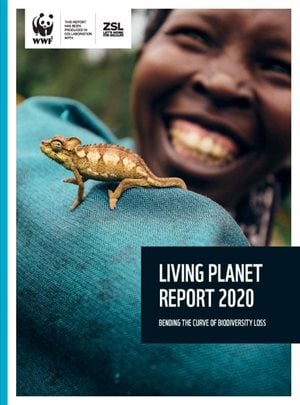






This Living Planet Report 2020 is the 13th edition of WWF's biennial flagship publication. It presents a comprehensive overview of the state of our natural world through the Living Planet Index (LPI), which tracks trends in global wildlife abundance, and contributions from more than 125 experts from around the world. Provided by the Zoological Society of London (ZSL), the LPI shows that the same factors believed to increase the planet’s vulnerability to pandemics (among them land-use change and the illegal wildlife trade) are some of the drivers behind the 68% average decline in global vertebrate species populations between 1970 and 2016.
The LPI, which tracked almost 21,000 populations of more than 4,000 vertebrate species between 1970 and 2016, also shows that wildlife populations found in freshwater habitats have suffered a decline of 84%, the starkest average population decline in any biome, equivalent to 4% per year since 1970.
The report includes pioneering modelling which shows that reversing the loss will only be possible if bolder, more ambitious conservation efforts are embraced and transformational changes made to the way we produce and consume food.
This modelling is based on a paper, "Bending the curve of terrestrial biodiversity needs an integrated strategy", co-authored by WWF and more than 40 NGOs and academic institutions and published today in Nature.
These proposed measures include making food production and trade more efficient and ecologically sustainable, reducing waste, and favouring healthier and more environmentally friendly diets.
Says Dr Morné du Plessis, CEO WWF South Africa: “Once again, this latest edition of the Living Planet Report reminds us of the intimate link between human health and wellbeing and that of the natural world. A key issue highlighted in the report is the pivotal role food production plays when it comes to habitat loss and the environmental degradation driving this precipitous decline in biodiversity.
“On the plus side, the modelling also shows that it is possible for us to stabilise and reverse these trends through more ambitious conservation efforts and by making fundamental changes to the way we live, including reducing food waste and through the pursuit of a more sustainable diet.”
The research shows that implementing these measures together rather than in isolation, will allow the world to alleviate pressures on wildlife habitats more rapidly. The modelling also indicates that if the world carries on with “business as usual”, rates of biodiversity loss seen since 1970 will continue over the coming years.
Download the full Living Planet Report 2020.